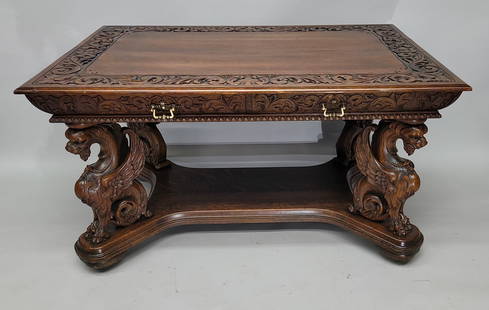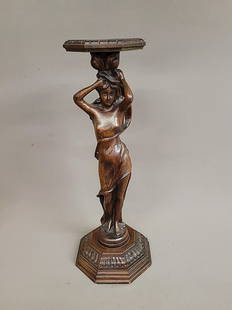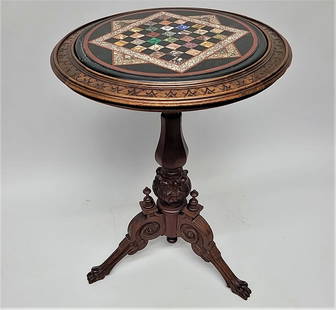
An early 19thc. coquilla nut carved jewellery cabinet
Similar Sale History
View More Items in Desks & Writing TablesRelated Desks & Writing Tables
More Items in Desks & Writing Tables
View MoreRecommended Tables
View More














Item Details
Description
An early 19th century coquilla nut carved jewellery casket/ table cabinet
Applied with carved putti, paterae, shells and swags, the rectangular hinged lid enclosing a mirror and purple silk lining above an ebony moulding, mask heads and sunbursts; the front with four drawers enclosing purple silk linings with ring tamed lion mask handles, with four similar smaller drawers to each side, flanked by female caryatids holding scrolling acanthus leaves and standing on winged dolphin heads, above an apron drawer on claw and ball feet, possibly French or German, 20cm wide, 13cm deep, 26cm high.
Coquilla nut is the fruit of the Brazilian Palm, which is related to the coconut palm, it polishes well and is the source of palm oil. Rudolph Ackermann purchased a considerable quantity of this fruit which could be found at his Repository at No.101 Strand and mention is made of the material in Ackermann's, The Repository of arts, literature, commerce, manufactures, fashions and politics, 1809, p.240-241.
This nut is of the same species as the cocoa nut, but without milk, and much smaller, and quite different in colour. From whence the Portuguese obtained it, is so little known, that even the botanical library of Sir Joseph Banks cannot ascertain the circumstance. The probably conjecture, however, is that it is the produce of Portuguese possessions in Africa. It is in great measure, unknown in this country, nor can it be otherwise, as it is near sixty years since the custom-house entries mention importation of it. The Dutch appear to have monopolized these nuts, for the purpose of supplying the towns of Nuremberg and Augsburg, where the finest turnery in Europe is generally known to have been produced.
The proprietor of these rare, curious and beautiful materials, has no doubt that the skill of British workmen will enable him to rival the best works of Germany in this branch of manufacture…. as it is susceptible of the most tasteful of forms- on the writing table, in wafer-boxes and seals, pounce, sand-boxes, & c- on the ladies’ work-table, in needle cases and thimble-cases, cotton boxes, pincushions….. in short, whatever has been formed from ivory, may be produced from the shell of the Coquilla, whose beauty will not fail to attract, while the price of the article will satisfy the purchaser.
Buyer's Premium
- 29% up to £50,000.00
- 25% above £50,000.00
An early 19thc. coquilla nut carved jewellery cabinet
Shipping & Pickup Options
Item located in Rickmansworth, ukPayment















































































